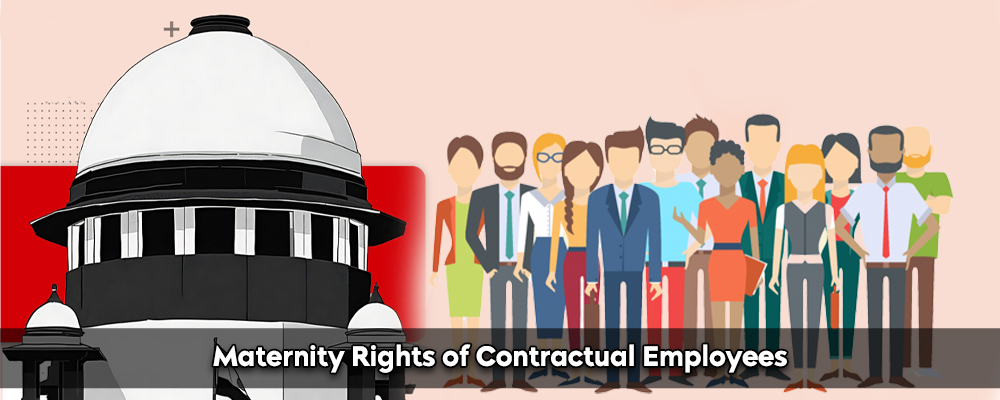Women employed under contract should be ingrained in the law. When the Maternity Benefit (Amendment) Act of 2017 is considered in the context of the explanations issued by the Ministry of Labour and Employment following its adoption, the Act’s scope is made obvious.
The issue is caused by the omission of the phrase “employment on a contractual basis” from Section 2 of the Maternity Benefits Act, which specifies when the Act is applicable. This suggests that the majority of those who are beneficiaries under this Act are not eligible to receive maternity benefits. However, court attempts to broaden the Act’s application have occurred.
Need A Legal Advice
The internet is not a lawyer and neither are you. Talk to a real lawyer about your legal issue

Applicability of the Act
This Act’s applicability is broken down into two categories: based on the type and size of the institution, and based on its applicability to a woman requesting benefits. The guidelines of this Act are mandatory for the following establishments:
- Factories, plantations, acrobatic and other exhibition venues, mines, and similar establishments
- Stores and other businesses
- Any company with ten or more staff members who have been there for at least one year;
- Any additional establishment that the Central or State Government has made known.
The Act will not be applied in industries where other maternity benefits regulations (such as the Employee State Insurance Act of 1948) are in effect. According to Section 5(2) of the Act, every woman employee who has worked continuously for eighty or more days in the twelve months immediately preceding her due date shall be eligible for the benefits under the Act.
Maternity Benefits Act restrictions
The Maternity (Amendment) Bill, 2017, a piece of Indian legislation, expanded the length of time that working women can receive maternity leave from 12 to 26 weeks. The third longest in the world, these 26 weeks. Despite widespread praise and commendation for the government’s efforts, just 1% of working women can make use of these perks. Because it only applies to businesses and organizations with at least 10 employees, the rule has a narrow scope. A very small part of all working women in India are employed by such organizations.
In companies and places with fewer than 10 employees, 84% of the workforce is made up of women. They are not eligible for the Act’s benefits as a result. Further, the Act does not directly and expressly indicate that it would apply to workers who are engaged under a contract.
Case Law
NEELAM KUMARI v. THE UNIVERSITY OF DELHI & ORS.
Facts
The petitioner is employed as a female attendant at the Geetanjali Hostel on Delhi University’s South Campus on an as-needed basis beginning on July 4, 2018, for a six-month initial term. The petitioner requested maternity leave beginning on May 5, 2022, and ending on November 4, 2022. The officer in charge of the responding institution extended the petitioner’s contractual term by six months. It is claimed that during the petitioner’s maternity leave, which lasted from July 2022 to November 2022, she was not paid. The petitioner was informed that her services had been terminated and she had been permanently replaced upon re-entering the respondent institution’s employ.
Issues
- Whether the respondent institution had the right to terminate the petitioner’s employment without warning and
- Whether the respondent institution is obligated to pay the petitioner’s wage during her maternity leave.
Judgment
The Hon’ble Court in its judgment has highlighted the fact that there was no notice given to the petitioner before the respondent institution terminated her services, hence this was an error. Additionally, the petitioner was first made aware of the abrupt end to her services when she returned to the institution of the respondent after her maternity leave had expired. The fact that a woman’s work is contractual cannot justify withholding maternity benefits from her, as this Court has repeatedly emphasized in a string of rulings. Denying the aforementioned privileges would be cruel and a violation of fundamental rights. In contrast to being founded on a statute, maternity rights are an essential component of a woman’s identity. Withholding these rights, which violates a woman’s fundamental right to life, prevents her from deciding to conceive. Such a refusal is in fact against the social fairness principle.
Conclusion
Recognizing and balancing women’s employment with that of males in the workforce is urgently needed. An essential element in achieving this goal is the provision of maternity leaves and benefits. If a pregnant woman is forced to work, the quality of the work will inevitably degrade. The primary purpose of maternity legislation is to safeguard the fundamental rights to life of female workers. The mother’s and the fetus’ rights to life are violated when these rights are denied.
A selection of legal services are offered by Lead India, including online tools and free legal advice. The best thing to do in this circumstance is to talk to a lawyer and ask a legal question.





 Talk to a Lawyer
Talk to a Lawyer